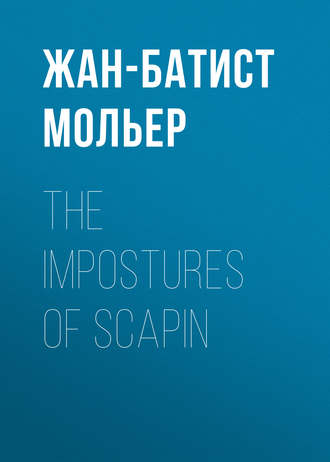
Мольер (Жан-Батист Поклен)
The Impostures of Scapin
SCENE VII. – SCAPIN, SYLVESTRE
SIL. You are a great man, I must confess; and things are in a fair way to succeed. But, on the other hand, we are greatly pressed for money, and we have people dunning us.
SCA. Leave it to me; the plan is all ready. I am only puzzling my brains to find out a fellow to act along with us, in order to play a personage I want. But let me see; just look at me a little. Stick your cap rather rakishly on one side. Put on a furious look. Put your hand on your side. Walk about like a king on the stage. {Footnote: Compare the 'Impromptu of Versailles'.} That will do. Follow me. I possess some means of changing your face and voice.
SIL. I pray you, Scapin, don't go and embroil me with justice.
SCA. Never mind, we will share our perils like brothers, and three years more or less on the galleys are not sufficient to check a noble heart.
ACT II
SCENE I. – GÉRONTE, ARGANTE
GER. Yes, there is no doubt but that with this weather we shall have our people with us to-day; and a sailor who has arrived from Tarentum told me just now that he had seen our man about to start with the ship. But my daughter's arrival will find things strangely altered from what we thought they would be, and what you have just told me of your son has put an end to all the plans we had made together.
ARG. Don't be anxious about that; I give you my word that I shall remove that obstacle, and I am going to see about it this moment.
GER. In all good faith, Mr. Argante, shall I tell you what? The education of children is a thing that one could never be too careful about.
ARG. You are right; but why do you say that?
GER. Because most of the follies of young men come from the way they have been brought up by their fathers.
ARG. It is so sometimes, certainly; but what do you mean by saying that to me?
GER. Why do I say that to you?
ARG. Yes.
GER. Because, if, like a courageous father, you had corrected your son when he was young, he would not have played you such a trick.
ARG. I see. So that you have corrected your own much better?
GER. Certainly; and I should be very sorry if he had done anything at all like what yours has done.
ARG. And if that son, so well brought up, had done worse even than mine, what would you say?
GER. What?
ARG. What?
GER. What do you mean?
ARG. I mean, Mr. Géronte, that we should never be so ready to blame the conduct of others, and that those who live in glass houses should not throw stones.
GER. I really do not understand you.
ARG. I will explain myself.
GER. Have you heard anything about my son?
ARG. Perhaps I have.
GER. But what?
ARG. Your servant Scapin, in his vexation, only told me the thing roughly, and you can learn all the particulars from him or from some one else. For my part, I will at once go to my solicitor, and see what steps I can take in the matter. Good-bye.
SCENE II. – GÉRONTE (alone)
GER. What can it be? Worse than what his son has done! I am sure I don't know what anyone can do more wrong than that; and to marry without the consent of one's father is the worst thing that I can possibly imagine. {Footnote: No exaggeration, if we consider that this was said two hundred years ago, and by a French father.}
SCENE III – GÉRONTE, LÉANDRE
GER. Ah, here you are!
LEA. (going quickly towards his father to embrace him). Ah! father, how glad I am to see you!
GER. (refusing to embrace him). Stay, I have to speak to you first.
LEA. Allow me to embrace you, and…
GER. (refusing him again). Gently, I tell you.
LEA. How! father, you deprive me of the pleasure of showing you my joy at your return?
GER. Certainly; we have something to settle first of all.
LEA. But what?
GER. Just stand there before me, and let me look at you.
LEA. What for?
GER. Look me straight in the face.
LEA. Well?
GER. Will you tell me what has taken place here in my absence?
LEA. What has taken place?
GER. Yes; what did you do while I was away?
LEA. What would you have me do, father?
GER. It is not I who wanted you to do anything, but who ask you now what it is you did?
LEA. I have done nothing to give you reason to complain.
GER. Nothing at all?
LEA. No.
GER. You speak in a very decided tone.
LEA. It is because I am innocent.
GER. And yet Scapin has told me all about you.
LEA. Scapin!
GER. Oh! oh! that name makes you change colour.
LEA. He has told you something about me?
GER. He has. But this is not the place to talk about the business, and we must go elsewhere to see to it. Go home at once; I will be there presently. Ah! scoundrel, if you mean to bring dishonour upon me, I will renounce you for my son, and you will have to avoid my presence for ever!
SCENE IV. – LÉANDRE (alone)
LEA. To betray me after that fashion! A rascal who for so many reasons should be the first to keep secret what I trust him with! To go and tell everything to my father! Ah! I swear by all that is dear to me not to let such villainy go unpunished.
SCENE V. – OCTAVE, LÉANDRE, SCAPIN
OCT. My dear Scapin, what do I not owe to you? What a wonderful man you are, and how kind of Heaven to send you to my help!
LEA. Ah, ah! here you are, you rascal!
SCA. Sir, your servant; you do me too much honour.
LEA. (drawing his sword). You are setting me at defiance, I believe…Ah! I will teach you how…
SCA. (falling on his knees). Sir!
OCT. (stepping between them). Ah! Léandre.
LEA. No, Octave, do not keep me back.
SCA. (to LÉANDRE). Eh! Sir.
OCT. (keeping back LÉANDRE). For mercy's sake!
LEA. (trying to strike). Leave me to wreak my anger upon him.
OCT. In the name of our friendship, Léandre, do not strike him.
SCA. What have I done to you, Sir?
LEA. What you have done, you scoundrel!
OCT. (still keeping back LÉANDRE). Gently, gently.
LEA. No, Octave, I will have him confess here on the spot the perfidy of which he is guilty. Yes, scoundrel, I know the trick you have played me; I have just been told of it. You did not think the secret would be revealed to me, did you? But I will have you confess it with your own lips, or I will run you through and through with my sword.
SCA. Ah! Sir, could you really be so cruel as that?
LEA. Speak, I say.
SCA. I have done something against you, Sir?
LEA. Yes, scoundrel! and your conscience must tell you only too well what it is.
SCA. I assure you that I do not know what you mean.
LEA. (going towards SCAPIN to strike him). You do not know?
OCT. (keeping back LÉANDRE). Léandre!
SCA. Well, Sir, since you will have it, I confess that I drank with some of my friends that small cask of Spanish wine you received as a present some days ago, and that it was I who made that opening in the cask, and spilled some water on the ground round it, to make you believe that all the wine had leaked out.
LEA. What! scoundrel, it was you who drank my Spanish wine, and who suffered me to scold the servant so much, because I thought it was she who had played me that trick?
SCA. Yes, Sir; I am very sorry, Sir.
LEA. I am glad to know this. But this is not what I am about now.
SCA. It is not that, Sir?
LEA. No; it is something else, for which I care much more, and I will have you tell it me.
SCA. I do not remember, Sir, that I ever did anything else.
LEA. (trying to strike SCAPIN). Will you speak?
SCA. Ah!
OCT. (keeping back LÉANDRE). Gently.
SCA. Yes, Sir; it is true that three weeks ago, when you sent me in the evening to take a small watch to the gypsy {Footnote: Égyptienne. Compare act v. scene ii. Bohémienne is a more usual name.} girl you love, and I came back, my clothes spattered with mud and my face covered with blood, I told you that I had been attacked by robbers who had beaten me soundly and had stolen the watch from me. It is true that I told a lie. It was I who kept the watch, Sir.
LEA. It was you who stole the watch?
SCA. Yes, Sir, in order to know the time.
LEA. Ah! you are telling me fine things; I have indeed a very faithful servant! But it is not this that I want to know of you.
SCA. It is not this?
LEA. No, infamous wretch! it is something else that I want you to confess.
SCA. (aside). Mercy on me!
LEA. Speak at once; I will not be put off.
SCA. Sir, I have done nothing else.
LEA. (trying to strike SCAPIN). Nothing else?
OCT. (stepping between them). Ah! I beg…
SCA. Well, Sir, you remember that ghost that six months ago cudgelled you soundly, and almost made you break your neck down a cellar, where you fell whilst running away?
LEA. Well?
SCA. It was I, Sir, who was playing the ghost.
LEA. It was you, wretch! who were playing the ghost?
SCA. Only to frighten you a little, and to cure you of the habit of making us go out every night as you did.
LEA. I will remember in proper time and place all I have just heard. But I'll have you speak about the present matter, and tell me what it is you said to my father.
SCA. What I said to your father?
LEA. Yes, scoundrel! to my father.
SCA. Why, I have not seen him since his return!
LEA. You have not seen him?
SCA. No, Sir.
LEA. Is that the truth?
SCA. The perfect truth; and he shall tell you so himself.
LEA. And yet it was he himself who told me.
SCA. With your leave, Sir, he did not tell you the truth.
SCENE VI. – LÉANDRE, OCTAVE, CARLE, SCAPIN
CAR. Sir, I bring you very bad news concerning your love affair.
LEA. What is it now?
CAR. The gypsies are on the point of carrying off Zerbinette. She came herself all in tears to ask me to tell you that, unless you take to them, before two hours are over, the money they have asked you for her, she will be lost to you for ever.
LEA. Two hours?
CAR. Two hours.
SCENE VII. – LÉANDRE, OCTAVE, SCAPIN
LEA. Ah! my dear Scapin, I pray you to help me.
SCA. (rising and passing proudly before LÉANDRE). Ah! my dear Scapin! I am my dear Scapin, now that I am wanted.
LEA. I will forgive you all that you confessed just now, and more also.
SCA. No, no; forgive me nothing; run your sword through and through my body. I should be perfectly satisfied if you were to kill me.
LEA. I beseech you rather to give me life by serving my love.
SCA. Nay, nay; better kill me.
LEA. You are too dear to me for that. I beg of you to make use for me of that wonderful genius of yours which can conquer everything.
SCA. Certainly not. Kill me, I tell you.
LEA. Ah! for mercy's sake, don't think of that now, but try to give me the help I ask.
OCT. Scapin, you must do something to help him.
SCA. How can I after such abuse?
LEA. I beseech you to forget my outburst of temper, and to make use of your skill for me.
OCT. I add my entreaties to his.
SCA. I cannot forget such an insult.
OCT. You must not give way to resentment, Scapin.
LEA. Could you forsake me, Scapin, in this cruel extremity?
SCA. To come all of a sudden and insult me like that.
LEA. I was wrong, I acknowledge.
SCA. To call me scoundrel, knave, infamous wretch!
LEA. I am really very sorry.
SCA. To wish to send your sword through my body!
LEA. I ask you to forgive me, with all my heart; and if you want to see me at your feet, I beseech you, kneeling, not to give me up.
OCT. Scapin, you cannot resist that?
SCA. Well, get up, and another time remember not to be so hasty.
LEA. Will you try to act for me?
SCA. I will see.
LEA. But you know that time presses.
SCA. Don't be anxious. How much is it you want?
LEA. Five hundred crowns.
SCA. You?
OCT. Two hundred pistoles.
SCA. I must extract this money from your respective fathers' pockets. (To OCTAVE) As far as yours is concerned, my plan is all ready. (To LÉANDRE) And as for yours, although he is the greatest miser imaginable, we shall find it easier still; for you know that he is not blessed with too much intellect, and I look upon him as a man who will believe anything. This cannot offend you; there is not a suspicion of a resemblance between him and you; and you know what the world thinks, that he is your father only in name.
LEA. Gently, Scapin.
SCA. Besides, what does it matter? But, Mr. Octave, I see your father coming. Let us begin by him, since he is the first to cross our path. Vanish both of you; (to OCTAVE) and you, please, tell Silvestre to come quickly, and take his part in the affair.






